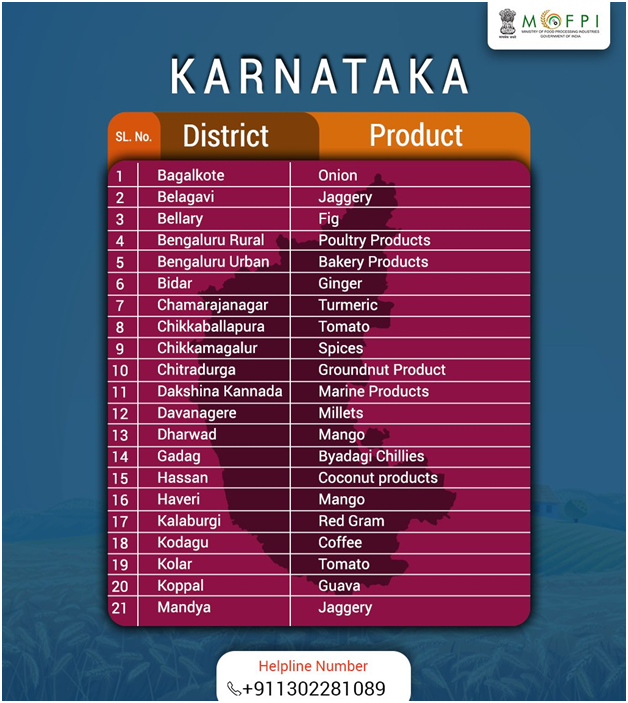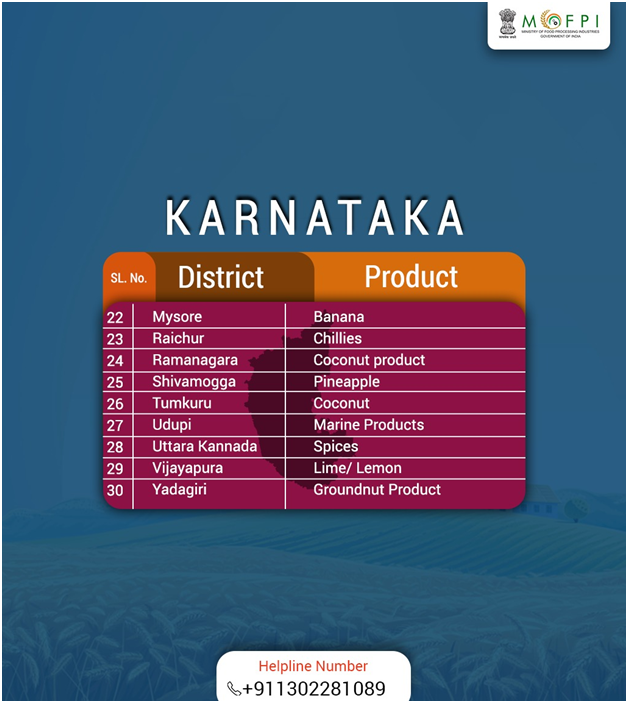PRADHAN MANTRI FORMALISATION OF MICRO FOOD PROCESSING ENTERPRISES (PMFME) SCHEME - ODOP (ONE DISTRICT ONE PRODUCT)
Introduction
I am a person with a foot firmly on the ground, I keep visiting the fishing town known as Malpe which is just 3 km from my place and one of the leading hubs for fishing which caters to both Indian and International markets basically Middle east Processed through Kerala. Malpe with the neighboring Mangalore district has been notified for Fishing in the ODOP list issued by the state government in consultation with the central government. There are 31 districts in Karnataka and each district has been assigned one product that has a comparative advantage over others and there are no production or availability constraints.
ODOP produce as a percentage of the total agricultural production of the district
Perishable nature of the produce: In our case, the fish has to be stored in cold storage or else it will be unsuitable for consumption, so to keep them chilled we have many ice plants catering to the immediate cold storage and competition is intense amongst the cold storage plants as it’s a buyers market due to overcapacity.
The presence of ODOP in that district compared to other districts and states as I said earlier we have the competitive edge as far as natural availability of fish is concerned and that's why the state government has notified the twin districts as fishing hubs.

The level of processing happening for ODOP in the district and outside the State is just not enough to have a catch of fish, it has to be immediately processed and graded accordingly to the ABC system of Grading and the fish at the lower end has to be sent to the preparation of Fish Meal for use in aquaculture and breeding industry down the line, that’s why you have fishes traveling from all the way from Malpe to Various hubs in Kerala and Kakinada in Andhra Pradesh.
The number of workers engaged in the ODOP cultivation and processing in this particular industry is heavily manpower-oriented and the local labor is just not enough so we have laborers from Uttar Pradesh, Bihar & Orissa doing the needful.
Marketing linkages within the district, state, and outside, level of infrastructure for ODOP processing within the district, in other districts and States.
The scheme also envisages strengthening backward and forward linkages, provision of common facilities, incubation centers, training, R&D, marketing & branding, provision of which would primarily be for ODOP products.
To understand it better let us see the different districts and which product has been assigned to them. In the state of the Karnataka, we have the following:


Financial Support to Individual Micro Enterprises: Credit-linked capital subsidy @35% of the eligible project cost, maximum ceiling Rs.10 lakhs per unit, Beneficiary contribution - minimum of 10% of the project cost, balance loan from Bank.
- FPO FarmersProducers organizations
- SHG Self help Groups
- SNA State Nodal Agency
- SLRM State Rural Livelihood Missions
Support to FPOs/ SHGs/ Producer Cooperatives: Credit linked Grant @35% to support clusters and groups such as FPOs/ SHGs/ Producer Cooperatives along their entire value chain for sorting, grading, storage, common processing, packaging, marketing, testing, etc.
Support to SHGs: Seed capital @Rs. 40,000/- per member of SHG involved in food processing activity for working capital and purchase of small tools, seed capital to be given as a grant to the SHG Federation by SNA/ SRLM for the loan to the members of SHGs
Support to individual SHG members as a single unit of the food processing industry with credit linked grant @35% of the project cost, maximum ceiling Rs.10 lakh. Support for capital investment at Federation of SHG level with credit linked grant @35%.
Support for Common Infrastructure: Credit linked grant @ 35% to support FPOs, SHGs, Cooperatives, any Government agency, or private enterprises for Common infrastructure. The common infrastructure will also be available for other units and the public to utilize on a hiring basis for a substantial part of the capacity.
If you carefully do a calculation if your unit has an outlay of Rs 3.5 Million Rupees then with the capital grant of Rs 1.00 Million you can easily save on the Interest part assuming you have taken a loan any way between 3-4 years repayment period (Approximate)
Common infrastructure to be funded under the scheme include Premises for assaying of agriculture produce, sorting, grading, warehouse, and cold storage at the farm-gate
Common processing facility for processing of ODOP produce;
The incubation Centre should involve one or more product lines for utilization by smaller units on a hire basis for the processing of their produce. The Incubation Centre may partly be used for training purposes. However, it should be run on a commercial basis.
Branding and Marketing Support: Grant up to 50% for Branding and Marketing support to groups of FPOs/ SHGs/ Cooperatives or an SPV (Special Purpose Vehicle) of micro food processing enterprises. It is to be provided for ODOP products at the State or regional level
The expenditure will be shared 60:40 between the Union and State governments. The Karnataka state government expected to allocate nearly ₹500 crores for five years from 2020-21 to 2024-25. The 2021-22 Budget is expected to set aside more than ₹100 crores for it.
In the state of Karnataka Agriculture Department, Karnataka State Agricultural Produce Processing and Export Corporation Ltd. is the project nodal agency, while the Central Food Technological Research Institute, Mysuru, has been roped in for providing technical expertise and support.
In the unorganized sector
It is estimated that in the country, unorganized enterprises contribute to 74% of employment (a third of which goes to women), 12% of the output, and 27% of the value-added in the food processing sector. Nearly 66% of these units are located in rural areas, while about 80% of them are family-based micro-enterprises, this is true because if you go through the various processing units located in and around the Malpe-Kodi belt you will find that the centers have many lady folks working in the processing, sorting & Grading of the fish with lots of Kerala Registered Cold Vans ready For transporting them for further delivery to overseas markets.
Conclusion
Actually, this scheme is very good as it identifies the strength of each district of India and accordingly attaches the economic significance and weightage to the same still remember the days when I was in UAE, the Chiquita bananas used to always come from the Philippines, Kiwi Fruit From New Zealand, Dragon Fruit From Thailand, Del Monte Pineapple once again from the Philippines, Apple from all over the world, they had carved a niche in their product, of course, Indian vegetables, fruits too were also available in plenty but there was no branding with exclusive stickers on them as I had noticed. The creation of a brand will create a higher value realization and easy acceptance amongst the consumers and this is what we are trying to do create more market for our products I do remember the famous words of Mr. Yousef Ali MA, founder of Lulu Group of Abu Dhabi "There is no recession in our kind of business because whatever be the economic compulsions, you can cut on all unnecessary expenditures save Food expenditure which you have to incur to feed your family" rightly said echoing with the aspirations and vision of our Prime Minister Modiji.








 CAclubindia
CAclubindia
